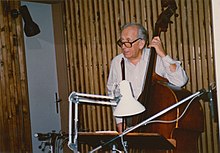Erwin Ernst Kunz
Erwin Ernst Kunz (born March 24, 1917 in Uster , Canton of Zurich ; † July 11, 2014 ) was a Swiss musician, composer, orchestra arranger, conductor, choir director and music theorist.
Life
Erwin Ernst Kunz grew up with his brothers Jakob and Willy in the then rural Uster. He received his first musical instrument, an old, defective hand organ, as a 10-year-old from his mother. A music teacher from Uster later provided him with a functioning accordion and gave the boy lessons. The poor conditions in the working-class family offered little scope for artistic activities. A far-sighted guardian enabled him to take the entrance exam at the Zurich Conservatory, which he successfully passed at the age of 17.
Professional musician
Kunz had an absolute ear for music . He attended the Zurich Conservatory for three years. At the age of 20 he was accepted into the Tonhalle Orchestra , where he played tuba and double bass from 1937 until his retirement in 1982. As a young musician, he studied the compositional techniques of the great masters such as Richard Wagner , Johannes Brahms , Anton Bruckner and other great composers and continued his education in music theory subjects.
International professional symphony orchestras from Vienna, Milan, Berlin, Beijing to Buenos Aires gladly engaged the tuba player as a newcomer . He was known among fellow musicians as "Tuba-Kuenz".
In addition to his work as an orchestral musician, Kunz was active and committed in a wide variety of areas of Swiss music creation. He conducted various professional and amateur music formations as well as choirs and officiated as a répétiteur for opera singers. He also worked as a production manager for music studios: he was responsible for the production of a CD series with Swiss songs and marches, which was written on the occasion of the 700th anniversary of the Swiss Confederation (“Cantonal marches from all over Switzerland” Vol. 1 + Vol. 2, "Swiss Songs from All Cantons" Vol. 1 + Vol. 2, all published in 1991 by K-Tel).
For many years Kunz was the Sunday organist and choirmaster in the Regensdorf prison . Under his direction, the choir recorded a phonogram together with the Salvation Army brass corps and soloists in the early 1970s. The collection of Christmas carols "The prisoner's choir of the Regensdorf prison sings Christmas carols" was sold with great success.
He performed regularly and for his personal enjoyment with folk music formations and played the tuba or double bass . Sometimes he played the accordion, among others with the Ländlerkapelle Edi Bär , the Freudenberger Dorfmusik by Otto Würsch or the Seldwyler Dorfmusik by Jakob Farner . After his retirement with the Tonhalle Orchestra, he taught tuba at the Lucerne Conservatory.
In the 1960s, Ernst Kunz conducted the "Züri-Leu" wind orchestra ( professional musician of the Tonhalle Orchestra) and in 1965 he played a musically valuable long-playing record of Swiss marching music with these musicians as conductor .
During his life, Ernst Kunz was also active as a composer , arranger and songwriter . From 1964 he was a member of SUISA . He composed marches, orchestral and choral pieces as well as singspiele and wrote or arranged countless wind and string orchestrations and arrangements. Most of his works are unfortunately lost. He had a particular fondness for children's songs. The many songs that he has written and set to music have been immortalized in the book "Children's songs: when the children sing, heaven laughs happily, all angels sing a loud Jubilo" (published in 2000).
Kunz composed the string arrangements for Les Sauterelles' album "View To Heaven" and conducted a 16-piece string orchestra for the recordings in the Bauer recording studio in Ludwigsburg . The songs orchestrated by Kunz also include the single "Heavenly Club", which made it to number 1 on the Swiss charts in 1968 . This single is considered to be the first Swiss production to reach the top spot in the official Swiss charts and thereby achieve an international breakthrough.
Popular music as arranger and conductor
From 1988 to 1989 Kunz dealt with the light music piano melodies of his nephew Rolf W. Kunz . From its melodies he created his own arrangements for a large orchestra (strings, wind instruments, etc.) with professional musicians from the Zurich Opera House , which resulted in two CDs . These recordings were documented with video and photo recordings, which was not yet common at the time.
swell
- Literature by and about Erwin Ernst Kunz in the bibliographic database WorldCat
- Erwin Ernst Kunz and Les Sauterelles
- Erwin Ernst Kunz on the website of Rolf W. Kunz
- Commemorative article on the SUISA website
Remarks
- ↑ Swiss National Sound Archives: FN catalog, detail. Retrieved November 3, 2017 .
- ↑ Swiss National Sound Archives: FN catalog, detail. Retrieved November 3, 2017 .
- ↑ Swiss National Sound Archives: FN catalog, detail. Retrieved November 3, 2017 .
- ↑ Swiss National Sound Archives: FN catalog, detail. Retrieved November 3, 2017 .
- ↑ Swiss National Sound Archives: FN catalog, detail. Retrieved November 3, 2017 .
- ^ Kunz, Erwin Ernst .: Children's songs . Ernst Kunz, Zurich 2000, ISBN 3-9522077-0-5 .
- ↑ Steffen Hung: Les Sauterelles - Heavenly Club - hitparade.ch. Retrieved November 3, 2017 .
- ↑ Music recordings for the CD's VOL. 1 & VOL. 2 - Rolf W. Kunz . In: Rolf W. Kunz . December 19, 1988 ( rolfwkunz.com [accessed November 6, 2017]).
| personal data | |
|---|---|
| SURNAME | Kunz, Erwin Ernst |
| ALTERNATIVE NAMES | Kunz, Ernst |
| BRIEF DESCRIPTION | Swiss musician and composer |
| DATE OF BIRTH | March 24, 1917 |
| PLACE OF BIRTH | Uster |
| DATE OF DEATH | July 11, 2014 |
